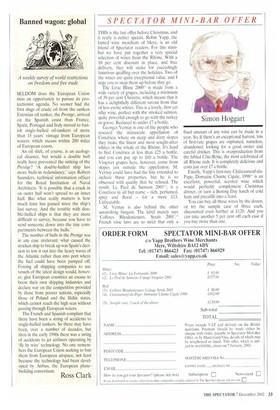Banned wagon: global
A weekly survey of world restrictions on freedom and free trade
SELDOM does the European Union miss an opportunity to pursue its protectionist agenda. No sooner had the first slugs of crude oil from the sunken Estonian oil tanker, the Prestige, arrived on the Spanish coast than France, Spain, Portugal and Italy moved to banish single-hulled oil-tankers of more than 15 years' vintage from European waters: which means within 200 miles of European coasts.
An oil slick, of course, is an ecological disaster, but would a double hull really have prevented the sinking of the Prestige? 'A double-hulled ship has more built-in redundancy,' says Robert Saunders, technical information officer for the Royal Institution of Naval Architects. 'It is possible that a crack in an outer hull won't spread to an inner hull. But what really matters is how much time has passed since the ship's last survey. And the trouble with double-hulled ships is that they are more difficult to survey, because you have to send someone down into the tiny compartments between the hulls.'
The number of hulls in the Prestige was in any case irrelevant: what caused the stricken ship to break up was Spain's decision to tow it out into the heavy waves of the Atlantic rather than into port where the fuel could have been pumped off. Forcing all shipping companies to use vessels of the latest design would, however, give European countries an excuse to boost their own shipping industries and declare war on the competition provided by those from poorer nations, especially those of Poland and the Baltic states, which cannot reach the high seas without passing through European waters.
The French and Spanish complain that there have been a string of accidents to single-hulled tankers. So there may have been, over a number of decades, but then in the early 1990s there was a string of accidents to jet airliners operating by 'fly by wire' technology. No one remembers the European Union seeking to ban them from European airspace, not least because the technology had been developed by Airbus. the European planebuilding consortium.
Ross Clark










































































 Previous page
Previous page